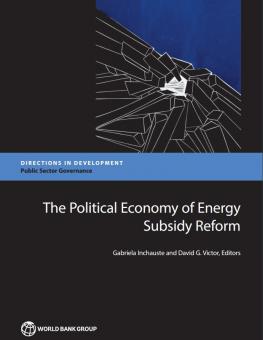
Chapter 4, Indonesia: Pricing Reforms, Social Assistance, and the Importance of Perceptions, The Political Economy of Energy Subsidy Reform
This World Bank book, edited by by Gabriela Inchauste and David G. Victor, brings together detailed chapters on the political economy of subsidy reform in four countries—the Dominican Republic, Ghana, Indonesia and Jordan —and draws overall lessons from their experiences.
IISD's Global Subsidies Initiative (GSI) contributed Chapter 4, "Indonesia: Pricing Reforms, Social Assistance and the Importance of Perceptions," on Indonesia's experiences with overcoming political obstacles to gasoline and diesel subsidy reforms. The chapter begins by reviewing the economic, fiscal and political context surrounding these subsidies. It then places them in their historical context, outlining the history surrounding their creation as well as the six major reform attempts since the 1997—98 Asian Financial Crisis.
Several themes arise in the course of the discussion. One is the importance between analyzing the political economy of, on the one hand, a subsidy policy and, on the other, a specific reform of that policy. Several types of reforms, each facing different sorts of challenges, are identified, which may be introduced independently or in unison: ad hoc price adjustments, introductions of new pricing systems; alternative policies to transfer benefits to citizens; and changing the state of perceptions and understanding about subsidy policy. Another theme is the importance of social assistance in mitigating the impact of reforms over time and the virtuous circle that can take place between subsidy reforms and investments in social assistance capacity. Lastly, the chapter examines the importance of understanding perceptions in order to understand the political challenges of reforming broad-based subsidies: the actual beneficiaries of reform may be very different from the people who think they are the beneficiaries. As such, "informational reforms"—interventions intended to improve the state of information about subsidies, designed with knowledge about popular perception in mind—can serve to increase a government's political operating space over time.
You might also be interested in
The Cost of Fossil Fuel Reliance
Government support for fossil fuels reached at least USD 1.5 trillion in 2023, new data shows.
Increased Support Needed to Achieve India's Clean Energy Goals
India is on track to achieve many of its 2030 clean energy goals but needs to step up government support measures to accelerate the deployment of offshore wind, electric vehicles, and green hydrogen, according to a new report.
Ending Export Credits for Oil and Gas: How OECD countries can end 2024 with a climate win
For a year now, Organisation of Petroleum Exporting Countries (OECD) governments have been negotiating an agreement that could put an end to oil and gas export finance. Following the acrimony in Baku, this would be a very real way for the OECD to show policy coherence, respond to calls from the poorest countries to stop subsidizing fossil fuels, and shift public finance to solutions.
Fossil Fuel Production, Renewable Energy, and Subsidy Reform in Nationally Determined Contributions 3.0
This policy brief provides an analysis of the critical benchmarks and recommendations necessary for aligning nationally determined contributions (NDCs) with the 1.5 °C target.